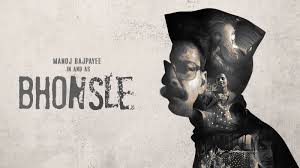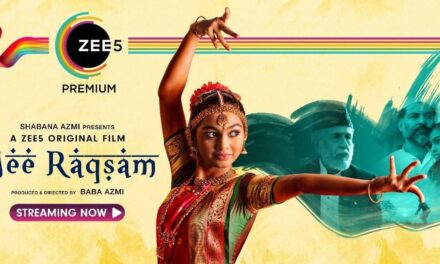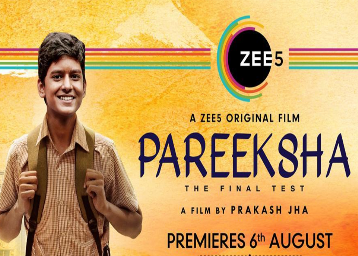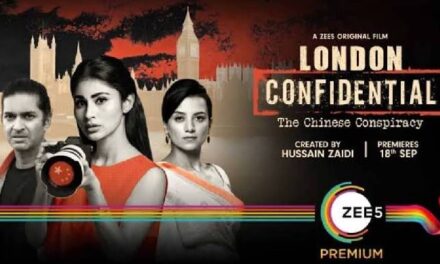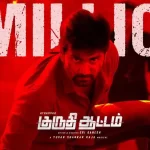Bhonsle (directed by Davashish Makhija) opens with a series of cross-cut scenes set in Mumbai, around the time of the city’s famous annual Ganesh Chaturthi festival. While on one hand we see large idols of the Hindu God Ganesha being prepped and adorned for the festivities, the scenes alternate to show the protagonist, Police Constable Ganpat Bhonsle (Manoj Bajpayee), being stripped off his police livery and accessories. He is a veteran at sixty and is being retired from the force, apparently against his wishes, going by his fervent requests to be re-enrolled on an extension.
The next few scenes explain this affinity of his to the force. He lives in a dingy, cramped one room apartment all by himself. It is not explicitly clear if he never married, or if his current solitary state is a result of some tragedy in the past. There is an air of melancholy around him as he goes about his mundane daily routine. He is also a man of few words, and over the course of the whole film, I doubt if his character had more than ten dialogue sets in total (Manoj Bajpayee’s dubbing session must have lasted for a lesser duration than the run time of this whole film)! His police work was his identity and refuge from monotony. He badly wants it back.
Part of the fun in watching mystifying, minimalist characters like Bhonsle playing out, is trying to build a more elaborate character sketch for them for ourselves, based on subtle cues left by the writers. For starters, you could easily tell that Bhonsle has led a virtuous life thus far and is generally liked and respected by his neighbours and colleagues alike. Further, I also settled on the notion that he probably never married, just like the God Ganesha, with whom his character and the central plot of the film share a visceral bond.
This said plot revolves around the Ganesh Chaturthi festivities being organized in the colony that Bhonsle lives in. This colony, like Mumbai itself, is a cosmopolitan melting pot and home to North Indian immigrants from various states (mainly Bihar) apart from native Marathis.
On the occasion of this year’s festival though, a bigotry ridden fringe group (led by the sleazy Vilas, played superbly by Santosh Juvekar) purports that only native Marathis be allowed exclusively to carry out celebrations in the colony. This angers the immigrants of course, who have their own support group led by Rajendra (Abhishek Banerjee of Paatal Lok fame) and fails to find too much support from the native Marathis either, especially Bhonsle, who is the senior most Marathi resident at the colony and would have none of this bigotry.
Having said this, Rajendra and his group of immigrants aren’t particularly saintly either. In a disquieting sequence, they harass and coerce a young immigrant boy Lalu, who has just moved into the colony with his elder sister Sita (the terrific Ipshita Chakraborty) to deface a wall in the colony’s library that had Marathi slogans inscribed. This simmers tensions even further and you sense that something would give soon enough.
Amidst all this, Bhonsle himself discovers that he has a larger battle to fight, a personal one. He’s been diagnosed with cancer and has limited time left. As a brooding Bhonsle walks back home from the hospital, we get to witness the film’s money-shot, an outrageous pullout shot filmed on the idol immersion day with Bajpayee placed in the middle of a crowd of 70,000 people. As the camera first focuses closely on Bhonsle, and then slowly pulls out into a distant aerial view, we feel what his character feels, a sense of smallness and obscurity, and of getting immersed (drowned, more like) suffocatingly into the unforgiving sea of mundane human existence.
Bhonsle’s upright character aside, this film also presents a scathing examination of the stark opposite kind, the one of Vilas. In a relative sense, Vilas’ actions begin harmlessly, as he canvasses door to door in the name of Marathi pride and honour. This soon turns violent and we see him having physical altercations with rival groups. Shit really hits the roof however when all this culminates shockingly in a chilling rape scene at the very end. Vilas’ character is a great example of the extreme depths to which communal brain-washing and hate mongering could make a man fall to.
Bhonsle is an impressive attempt and reminded me a lot of another of my favourite films, Clint Eastwood’s Gran Torino. You could draw vivid parallels between the characters of Walt from that film (an army veteran) and Bhonsle in this film. Both these characters are men of supreme honour and end up as guardian angels, sworn to protect a neighbourly sibling duo in plight. As Bhonsle has his face-off with Vilas and puts him down, we sense the final hurrah of a hardened policeman. He can now hang up his boots proudly, and truly rest in peace.
Bhonsle is now streaming on the OTT platform SonyLiv.
Overall rating: 3/5

